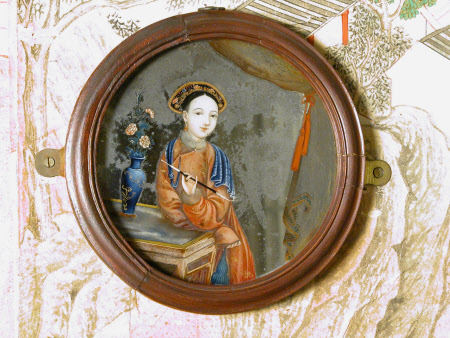Mirror
Category
Mirrors
Date
c. 1770
Materials
Glass, mercury, pigments, wood.
Place of origin
Guangzhou
Order this imageCollection
Saltram, Devon
NT 872230.1
Summary
Mirror painting, glass, mercury and pigments, round format, made in Guangzhou (Canton), Guangdong Province, China, c. 1770, depicting a lady in Manchu dress in an interior, leaning on a table on which stands a vase of flowers, holding a pipe, with draperies above.
Full description
Chinese mirror paintings (or reverse glass paintings) were particularly fashionable in Europe during the second half of the 18th century and the early 19th century. The mirrored glass was made in Europe and shipped to Guangzhou where some of the mirrored surface was removed and painted on. This resulted in the creation of hybrid mirror-paintings which were then shipped back to Europe as decorative objects reflecting (in more ways than one) the fictionalised European conceptions of China. The origins of this type of object may lie in 1664, when the Dutch East India Company presented some mirrors to the Kangxi Emperor. The earliest known mention of Chinese mirror paintings in Britain dates to 1739, when six of them are recorded arriving in London by ship (Audric 2020). One of the subjects depicted on Chinese mirror paintings is the meiren 美人 or ‘beauty’, an idealised representation of elegantly dressed women (in either Han-Chinese or Manchu costume), engaged in cultured pursuits in luxurious interiors or gardens – a type of image that already had a well-established history in other forms of Chinese pictorial art (Cahill 2010).
Provenance
Accepted by HM Government in lieu of inheritance tax and allocated to the National Trust, 1957.
References
Audric 2020: Thierry Audric, Chinese Reverse Glass Painting, 1720-1820: An Artistic Meeting between China and the West, Bern, 2020, pp. 29 and 160. Cahill 2010: James Cahill, Pictures for Use and Pleasure: Vernacular Painting in High Qing China, Berkeley, Los Angeles and London, 2010.
